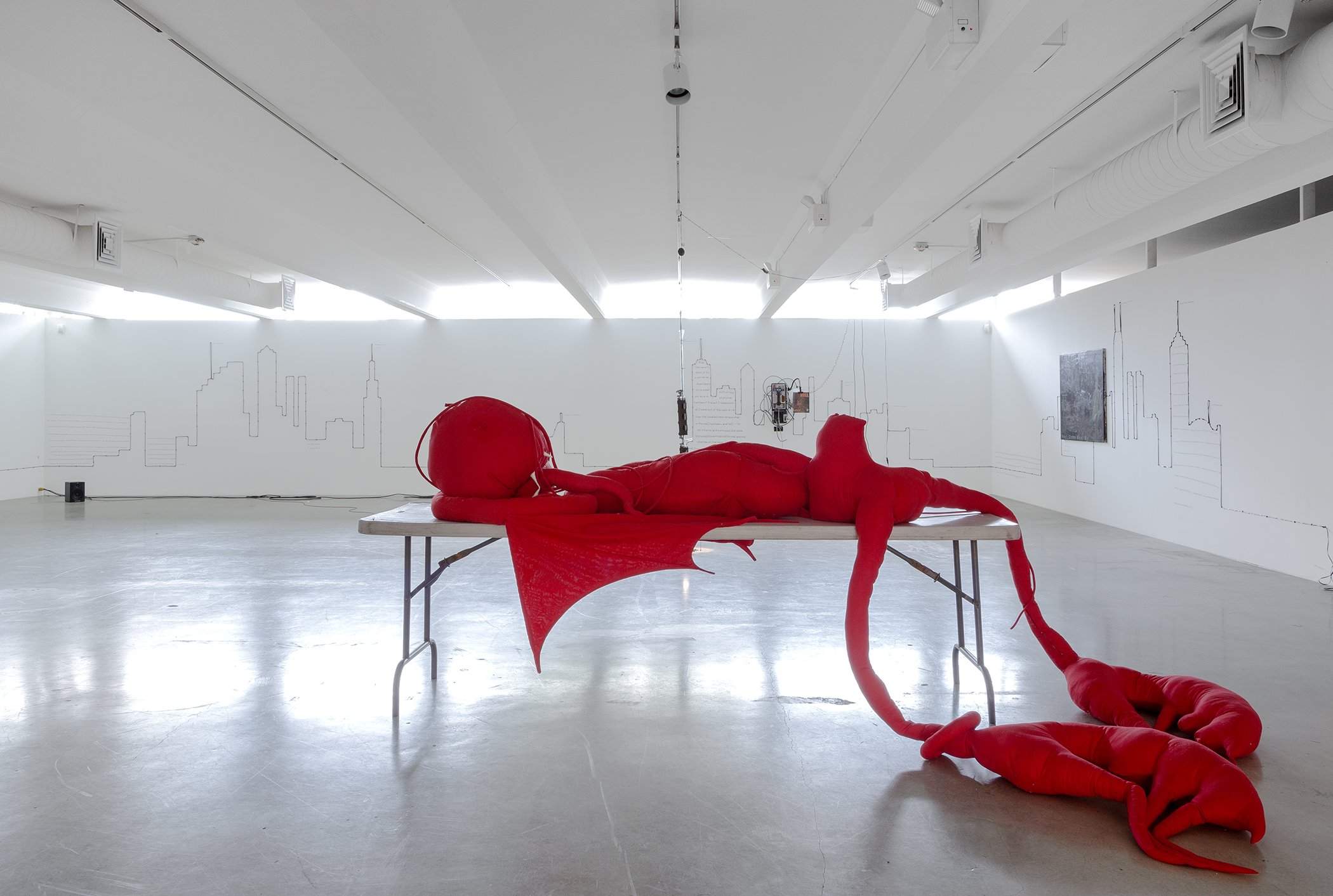Embodiment – Miami: Rosa Aiello, Renaud Jerez, Jason Matthew Lee, Ben Schumacher
2–7 December 2015, Miami
Embodiment, Galerie Catherine Bastide at The M BUILDING Miami, 2015, exhibition view
Embodiment
Galerie Catherine Bastide at The M BUILDING Miami
Rosa Aiello, Jason Matthew Lee, Renaud Jerez and Ben Schumacher are all associated with a wave of artists from the first decade of the Millennium that grew up with a culture of virtual images and the Internet. It is thus striking to note in their approach a return to materiality and mutability that sends us back to a certain form of mysticism and an animistic sensuality that could be qualified as “Digital Skepticism.”
Renaud Jerez moves from the state of lyophilization of his mummy-sculptures, from the inert and empty-of-substance to the living, the organic, the liquid, the blood from languid material human-sized vampire-like red stuffed figures looking almost skinned. Here, vampirisation tenderly happens; infection softly propagates itself; the monster, the parasite is funny and sweet and recalls a certain type of soft sculpture from the avant-gardes of the 1970s. It would be almost possible to see this as a kind of Pop shamanism where the voodoo artist lets us consume his own demons in a tactile manner. A gentle “Theater of Cruelty” where “the action...as with the Plague, is salutary” (Antonin Artaud).
Jason Matthew Lee is interested in the history and theory of pre-internet communication, through a personal approach, revealing their myths and paradoxes. He presents a series of Payphones, telephonic machines harking back to pre-internet hacking. These analog objects have the charm of an obsolete technology, recalling Cyberpunk and even Steampunk cultures, the sort of post-apocalyptic or retro-futurist devices that contain urban melancholy and symbolize the functioning of our neo-liberal societies. We can still read, 1. Stop 2. Listen for tone 3. Deposit coin. A true poetical mechanics, as with this other Payphone titled “Flowers of Evil”, these objects are urban totems containing the complexity and subjectivity of all forms of communication.
With degrees in philosophy and literature, Rosa Aiello tackles CG animation and video editing as a type of emotional associative language that challenges the viewer’s relation to space and to the body.
In her animations, embodiment occurs in the absence of human forms, objects shift from a dormant, latent state to a carnal and sensual mode, fraught with possibility and suspense. Camera movements suggest a subjectivity that exists behind the frame, an off-screen presence who perceives and guides the viewer’s experience.
For the exhibition at the M Building, Ben Schumacher has chosen to present a group of three oil paintings. In a deft play on stratification and erasure, wherein the painted surface is eclipsed by a flatbed-printed photographic image, a new composition materializes. Time circulates and moves from the painterly stroke to a digital state, accelerating to the here and now of a scanned image, only to be crystallized once again on the picture plane. The resulting paintings are characterized by their hybrid and anachronistic qualities. In the midst of a strange fictional narrative painted figures mingle with both anonymous and renowned architectural constructions (such as the New York High Line). The scenes depicted alter and contaminate spaces and buildings. Spatiotemporal levels interpenetrate varying materials in compositions akin to the surrealist exquisite corpse, free association and aleatoric collages, allowing repressed truths to return from the unconscious mind.
Virtuality, material wizardry, pagan vitality or urban sensibility, above all, Embodiment presents a generation of artists reinventing itself and its own culture.
Lilou Vidal
(Extract from the text Embodiment, Nov 2015)








